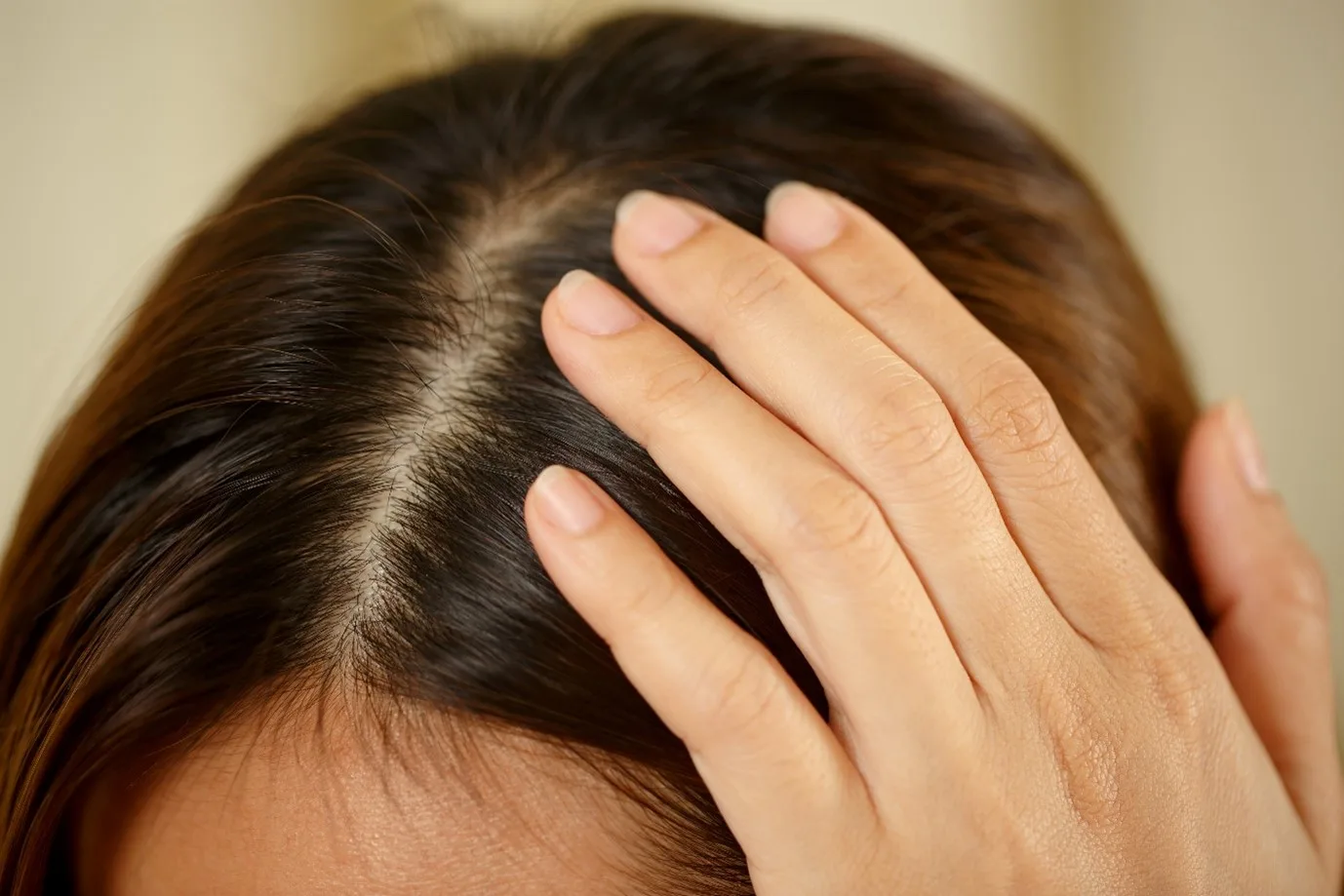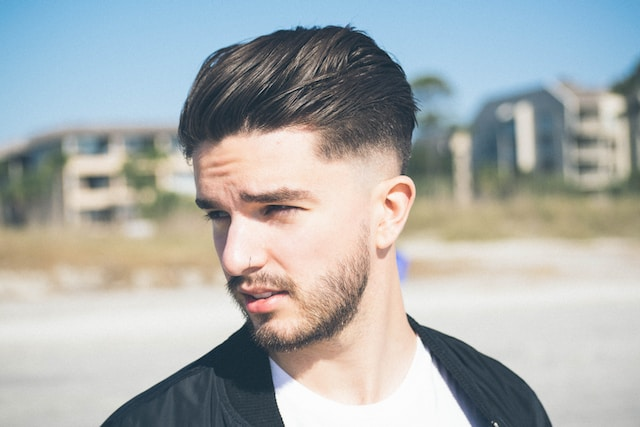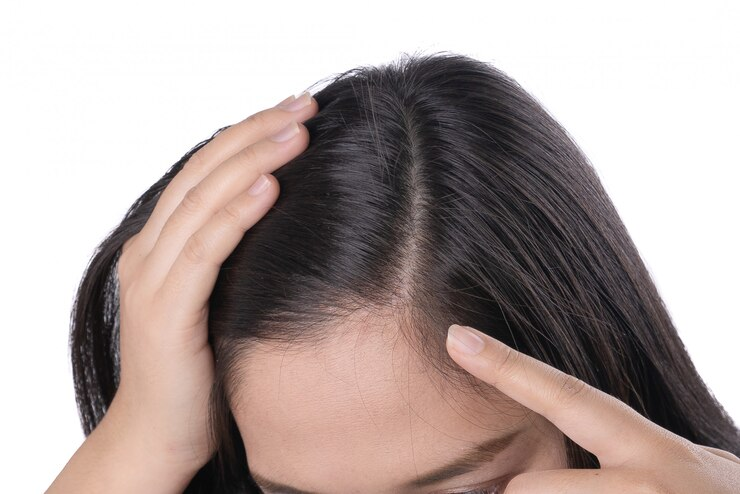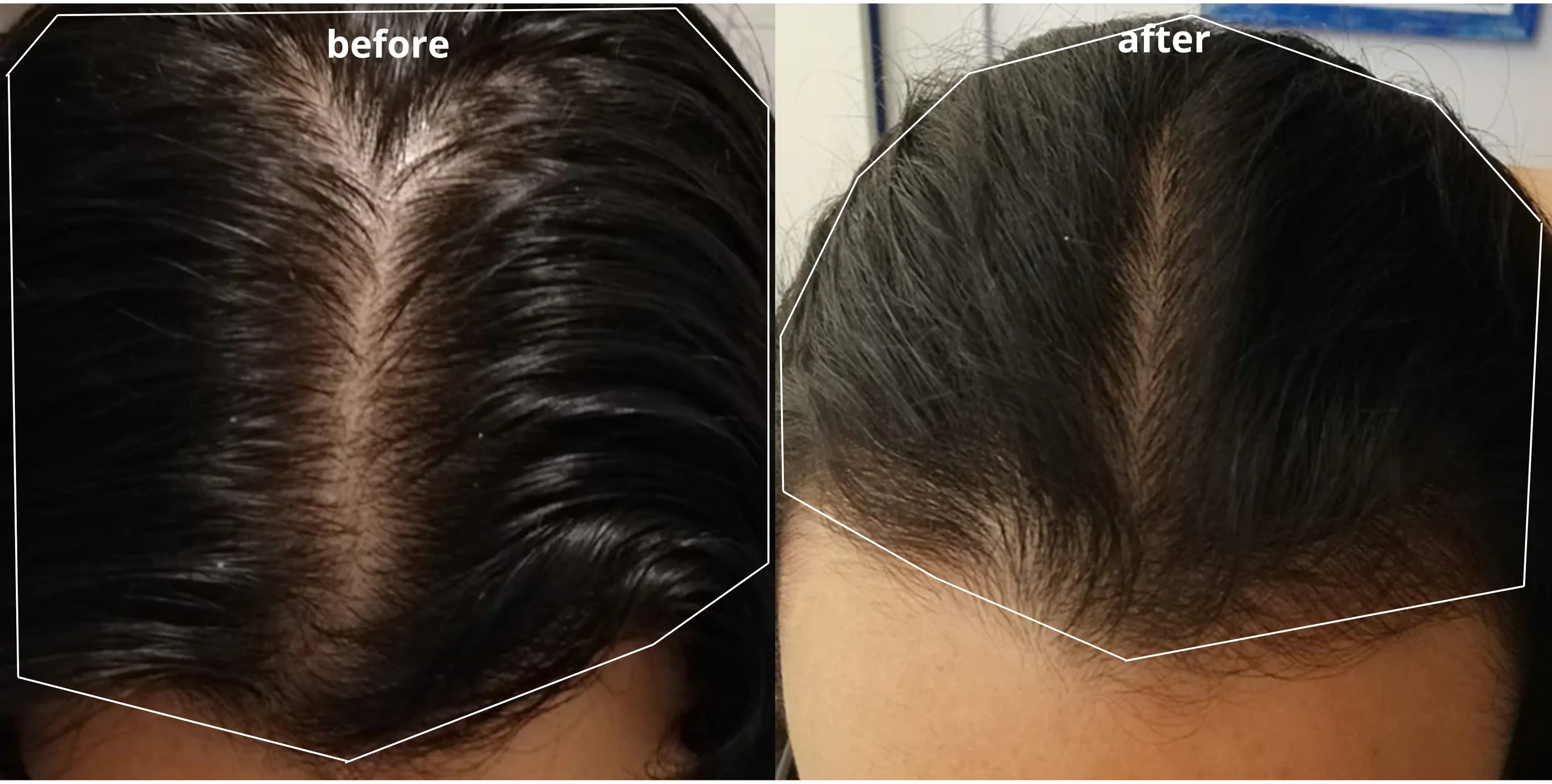Itchy scalps and hair growth might seem unrelated, but they share some connections. An itchy scalp can be annoying and uncomfortable, but it's also a sign that your scalp is reacting to various factors. These factors can affect how well your hair grows.
It is crucial to understand why your scalp itches and how scalp itches links to your skin and hair follicles's health.
This blog will explore the basics of this connection, shedding light on what you need to know to keep your scalp and hair in good shape.
Table of content
What causes an itchy scalp?

An itchy rash or scalp is a common issue caused by several factors, ranging from skin conditions to daily habits. Here are some common causes of an itchy scalp or rash:
- Dandruff: Flakes and an itchy scalp due to yeast-like fungus or other skin conditions.
- Dry Skin: Less oil production can lead to itchiness and flaking.
- Product Buildup: Hair care products can accumulate and irritate the scalp.
- Psoriasis: A condition that leads to red, scaly patches on the scalp.
- Contact Dermatitis: Allergic reactions to hair products or materials.
- Lice: Parasitic insects that cause intense itching.
As your leading source for hair health information over the past 4 years, we never compromise on accuracy. When it comes to your health, you deserve information you can truly rely on - and earning your trust is our top priority.
Here's how Scandinavian Biolabs ensures every piece of content meets the highest standards of accuracy and integrity:
- Credentialed Experts: Our reviewers are actively practicing doctors and medical researchers
- Stringent Reviews: Content undergoes rigorous editing by subject specialists and review by a practicing doctor.
- Evidence-Based: We rely on well-established research from trusted scientific sources like peer-reviewed journals and health authorities.
- Full Transparency: Our editorial standards, writer credentials, reviewer credentials, correction process, and funding are all publicly documented.
- Independent Voice: While we do promote products, we operate in a vacuum to business operations. Our main goal is just an unwavering commitment to providing medically-sound guidance.
You can count on Scandinavian Biolabs to consistently deliver the trustworthy health information you deserve. Read our Editorial Standards.
Does hair itch when it starts growing?

Yes, hair can itch when it starts growing, especially in areas where the hair is coarse or where shaving is common, such as the scalp, face, or pubic region. This itching is often due to the hair piercing through the skin or thin hair's surface, which can irritate the skin or cause ingrown hairs, leading to discomfort excessive scratching.
When hair regrows after shaving, waxing, or other forms of hair removal, the new hair tips can be sharp, making the skin around the hair follicles feel itchy as they poke through.
Additionally, hair growth can stretch the skin and hair follicles slightly, causing a sensation that some people find itchy. Proper skincare and maintaining a healthy scalp environment can help minimize discomfort during hair regrowth.
Why do hair loss treatments make your scalp itch?
treatments can make your scalp itch due to their active ingredients, which may cause irritation or an allergic reaction in some individuals. These treatments often contain potent chemicals designed to stimulate hair growth or prevent hair loss, which can lead to scalp dryness, flaking, or inflammation, resulting in itchiness.
For instance,treatments like minoxidil (found in products like Rogaine, used for hair thinning) can cause dryness and scaling, leading to itchiness. Similarly, prescription medications or topical treatments may contain ingredients that some scalps are sensitive to, triggering an itchy reaction.
Additionally, the alcohol base used in many topical treatments can dry out the scalp, exacerbating the itchiness. It's important to follow application instructions carefully and consider using gentle, moisturizing products to help mitigate these effects.
If the itching persists, consulting with a healthcare professional is advisable to ensure the chosen treatment is suitable and to explore alternative options if necessary.
How to prevent an itchy scalp?
To prevent an itchy scalp, maintain a healthy scalp environment by keeping it clean and moisturized and avoiding irritants.
Here are vital steps to help prevent discomfort:
- Use Gentle Hair Care Products: Choose shampoos and conditioners formulated for sensitive skin or specific scalp conditions.
- Stay Hydrated: Drink plenty of water to help keep your skin and scalp hydrated.
- Limit Hair Product Use: Avoid excessive styling products that can build up and irritate the scalp.
- Wash Regularly: Keep your scalp clean by washing your hair regularly, but avoid over-washing, which can strip natural oils.
- Use a Humidifier: If you live in a dry climate, using a humidifier can help maintain moisture levels in your environment, benefiting your scalp.
- Diet: Include foods rich in omega-3 fatty acids, vitamins, and minerals to support skin health.
- Avoid Hot Water: Use lukewarm water when washing your hair to prevent drying out your scalp.
- Scalp Massage: Regularly massage your scalp to improve blood circulation and help distribute natural oils.
What are the signs of new hair growth?
New hair growth manifests in several noticeable ways, contributing not only to the volume but also to the overall health of your hair. Understanding these signs can reassure you during hair growth treatments or recovery from a hair loss treatment.
Short new hairs
The most apparent sign of new hair growth is the appearance of new hairs sprouting from the scalp. These are typically much shorter than the rest of your hair and can be easier to spot in areas you know have been thinning or where you've experienced hair loss.
Soft texture
New strands often have a smoother and finer texture than older hair. They have not been exposed to environmental damage or styling products and tools.
Baby hairs
You might notice fine, soft hairs that are shorter than the rest of baby hair along the person's hair-line. These baby hairs are natural and can indicate new hair growth, especially if you see more of them over time.
Shedding
Interestingly, moderate shedding is part of a healthy hair growth cycle. Seeing hairs fall out means that new ones are coming in to replace them. However, the key is to treat hair loss in moderation; excessive shedding could indicate a problem.
Change in scalp feel
You might feel a slight, tingling sensation, itching, or sensation of fullness in some regions of your scalp. These sensations can sometimes precede the appearance of new hair growth as the follicles become more active.
Increased scalp visibility
New hair growth, especially after shedding, can make the scalp more visible in certain areas. However, as the new hairs grow longer and thicker, they will contribute to overall hair density, reducing scalp visibility.
Differences in hair density or volume
Over time, your hair grows, and as more new hair grows and existing hairs continue their growth cycle, you may notice an increase in hair density or volume, making your hair feel fuller and thicker.
Recognizing these signs can be very encouraging, especially for individuals concerned about hair loss or undergoing treatment for hair growth. Maintaining a healthy scalp environment and following any treatment plans recommended by healthcare professionals to further hair loss and support new hair growth is essential.
What can you do about an itchy scalp?

If you're dealing with an itchy scalp, you can employ several effective strategies to find relief from head itch and address the underlying causes of dead skin and itching scalp itself. Here are some critical approaches:
Use gentle hair care products
Opt for shampoos and conditioners that are mild and designed for sensitive scalps. Look for hair products that are free from harsh chemicals like sulfates and parabens.
Maintain proper hygiene
Wash your hair regularly to remove the buildup of oils, sweat, and products, but avoid over-washing, which can strip the scalp of natural oils and exacerbate dryness.
Stay hydrated
Ensure you're drinking plenty of water throughout the day to help maintain the health of your skin and scalp from the inside out.
Apply natural oils
Natural oils like coconut, jojoba, and tea tree oil can moisturize the scalp, reduce hair loss, and relieve scalp itching. However, use them sparingly and patch test first to avoid adverse reactions.
Avoid scratching
Scratching can worsen the itchiness and lead to further irritation or infection. Try patting or tapping the itchy area instead.
Use a humidifier
If dry air contributes to your own itchy skin and scalp problems, using a humidifier in your home or office can help maintain a more favorable humidity level for your skin and scalp.
Consult a dermatologist
Consulting a dermatologist is wise if your itchy scalp persists despite home remedies, or if you suspect an underlying skin condition, like psoriasis or dermatitis. They can provide targeted treatment options and professional advice.
A better approach for your overall hair health

The Bio-Pilixin® Serum by Scandinavian Biolabs is a groundbreaking recovery serum meticulously designed to help promoting hair health and stimulate new growth.
Crafted with various plant growth factors through cutting-edge stem cell technology, this serum provides deep nourishment to the scalp, soothing irritation and reducing hair itchiness throughout. Its unique formula is focused on strengthening hair follicles and ensuring vigorous hair growth from the roots.
Clinically proven to show significant improvements in scalp health and hair vitality within just 45 days, the Bio-Pilixin® Serum stands out for its effectiveness in enhancing scalp condition and fostering healthy hair development.
Formulated to support a healthy scalp environment, users have experienced noticeable relief from scalp itchiness and discomfort. In clinical evaluations, 93% of participants reported satisfactory outcomes, highlighting decreased scalp irritation and a boost in hair growth.
Safe for everyday application, this plant-based serum is tailored to rejuvenate your scalp, offering the nourishment and care essential for optimal hair growth.
Each ingredient within the Bio-Pilixin® Serum is selected based on rigorous scientific evaluation for the highest quality. Capilia Longa, derived from Curcuma longa stem cells, has significantly reduced scalp irritation and promote a healthier scalp environment, leading to a 52% improvement in hair density.
Niacinamide enhances blood circulation and shields hair follicles from environmental stressors, supporting sustained hair growth.
This trio of key ingredients positions the Bio-Pilixin® Serum as a transformative solution for those battling an itchy scalp and seeking to improve hair health.
Confident in the serum's capacity to deliver results, Scandinavian Biolabs offers a money-back guarantee after 150 days if you're not fully satisfied.
Conclusion
An itchy scalp can be distressing, influenced by dandruff, dry skin, and product buildup. Addressing the root cause is essential for relief and promoting healthy hair growth.
The Bio-Pilixin® Serum by Scandinavian Biolabs offers a comprehensive solution, targeting itchy scalp issues while nurturing hair follicles for enhanced growth.
Its scientifically backed, plant-based formula delivers noticeable results in itchy scalp health and hair density. Safe for daily use, this serum represents a pivotal step towards overcoming scalp discomfort and achieving a healthier, fuller head of hair.
FAQs
What are the common causes of an itchy scalp?
Common causes include dandruff, dry skin, product buildup, psoriasis, contact dermatitis, and even head lice and infestations.
Does hair growth cause an itchy scalp?
Yes, new hair growth can cause scalp itching due to the many hair follicles piercing through the skin or when the hair follicle is stretched.
Does an itchy scalp means hair growth reduction?
Not necessarily. An itchy scalp is often a symptom of various conditions or reactions, such as dandruff, dry skin, or contact dermatitis, rather than a direct indicator of hair growth reduction. However, the underlying issues causing the itchiness can sometimes affect hair health and growth indirectly.
How can I prevent an itchy scalp?
Preventative measures include using gentle hair care products, maintaining proper hygiene, staying hydrated, and applying natural oils sparingly.
Are there signs indicating new hair growth?
Signs of new hair growth include short new hairs, soft texture, baby hairs, and a change in scalp feel or hair density.
How do hair loss treatments potentially cause scalp itchiness?
Some hair loss treatments contain potent chemicals that can dry out or irritate the scalp, leading to itchiness.
Resources:
- https://www.webmd.com/beauty/ss/slideshow-foods-healthy-hair
- https://www.hairscientists.org/hair-and-scalp-conditions/nutrition-and-hair-health
- https://nyulangone.org/news/most-men-experience-hair-loss-it-isnt-inevitable
Read More:
- 15 Hair Loss Hairstyles for Thinning Hair on Crown of 2024
- Rosemary Oil for Hair Growth Before and After Results: Here's What to Expect
- Is Keratin Treatment Bad for Hair? Here’s Everything You Need To Know






